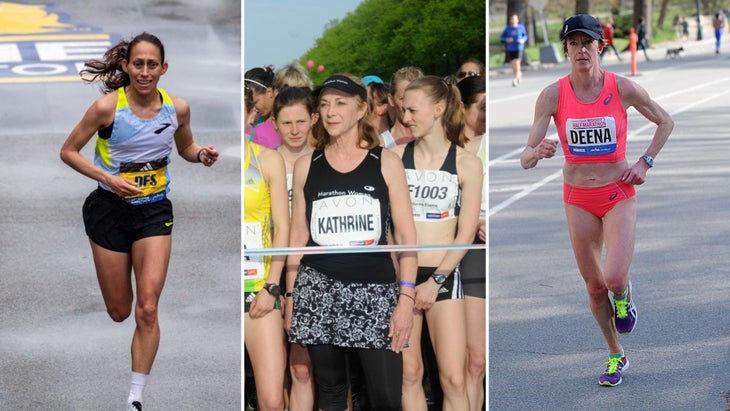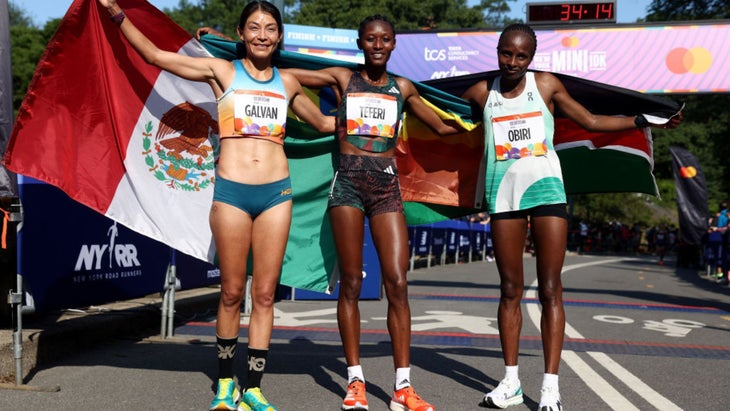New perk: Easily find new routes and hidden gems, upcoming running events, and more near you. Your weekly Local Running Newsletter has everything you need to lace up! Subscribe today.
On November 16, 7,000 women will flock to Savannah, Georgia, for Every Woman’s Marathon, a new 26.2-mile women’s race designed and supported by some of the country’s most iconic female athletes. The event is curated to be accessible and inclusive, and aims to be a celebration of women, no matter where they are on their running journeys.
While there are many things you should know about this inaugural race, we’ve come up with 10 that we think are particularly important:
1. The race is inclusive, but is catered toward the female experience.
Every Woman’s Marathon was born from the desire to host more female-centric marathon experiences in the U.S. The 26.2-mile event is meant to provide a safe space for all women, from experienced runners to first-time marathoners. Upon signing up, participants were given helpful resources like nutrition plans, training guides (tailored to runners based on experience) and access to a community of women runners excited to share goals, tips, progress, and more. The race is designed to be as inclusive as possible, with nursing pods, and wheelchair accessible lanes.
2. It takes place in Savannah, Georgia.
There’s a reason Savannah is nicknamed “the Hostess City of the South,” as it welcomes around 17 million visitors annually and boasts beautiful architecture, rich history, delicious food, and top-tier hospitality. Every Woman’s Marathon starts in front of the historic Savannah City Hall and guides runners through oak-lined streets and city squares, passing iconic landmarks like the Grayson Stadium—which is home to the Savannah Bananas baseball team. It’s a relatively flat loop, and ends on East Broad Street, where runners and spectators will celebrate at the finish festival in the Trustee’s Garden. The course is USATF-certified and a Boston Marathon qualifier.
3. The race was organized with the help of notable advisors like marathon legends Kathrine Switzer, Des Linden, and Deena Kastor.

When designing the event, race organizers knew they’d need a team of experienced female runners to guide them in creating a race truly catered towards women. The advisory team is made up of: Kathrine Switzer, a women’s sports pioneer and the first woman to officially run the Boston Marathon in 1967; Des Linden, a two-time U.S. Olympic marathoner and 2018 Boston Marathon champion; and Deena Kastor, a three-time Olympian, 2004 bronze medalist in the marathon, and previous American record holder in the half-marathon and marathon. In addition, Allison Mariella Desir, activist and author of Running While Black, and Danielle Mclaughlin, a two-time cancer survivor and former national and world champion paratriathlete, are also Every Woman’s Marathon running captains.
All these faces will be seen at the expo, which is host to panel discussions, cooking classes, yoga flows, and musical acts.
RELATED: Kathrine Switzer and 10 Other Inspiring Women Who Have Ruled the NYC Marathon
4. It supports female–centered charities like Girls on the Run and 261 Fearless.
The race aims to raise awareness and funds for organizations founded to advance women and young girls, especially in sports. Charity partners include Black Girls Run!, a nonprofit that encourages Black women to feel empowered through running, Girl Scouts of Historic Georgia, and St. Jude Children’s Research Hospital. Another partner is 261 Fearless, an organization co-founded by Switzer that offers resources, education, and running opportunities to help women discover their potential. And last but not least, every race signup results in a donation to Girls on the Run, which provides girls with programs to build confidence and decision making skills.
5. This is not the first women’s-only race in the U.S.

Though many people might be hearing about a women’s-only race for the first time, these kinds of events have been happening in the U.S. for years. The New York Mini 10K, held in early June, is the oldest women’s focused running event in the world, dating back to its inception in 1972 (when it was known as the Crazylegs Mini Marathon). In 1977, Switzer founded the Avon International Running Circuit, a global series of women’s races that included more than 400 events, in order to meet the International Olympic Committee’s requirements of a minimum of 25 countries participation for the new Olympic event of the women’s marathon.
Flash forward to recent years, and race platform RunSignup reports it hosted 124 women’s-only running races in the country. Nike had a series of successful women’s-only races, including the Nike’s Women Marathon and Half Marathon events in San Francisco, Washington DC, and Toronto. The most recent and last event was held in 2015 in San Francisco and drew 25,000 runners before the race series was put on pause. (The company said earlier this year it was planning to restart the women’s races in the future.) Meanwhile, the VHTRC Women’s Half Marathon, a women’s trail running race in Fairfax Station, Virginia, celebrated its 30th year in September, and the Boston 10K for Women (previously called the Tufts 10K) has been a celebrated tradition since 1977.
RELATED: ASICS Exercise Study Reveals Startling Barriers Women Face
6. It was created and sponsored by Team Milk.
Team Milk is responsible for this inaugural women’s-focused marathon. “We wanted to do more than organize a race,” says the Milk Processor Education Program (MilkPEP) CEO Yin Woon Rani. “Instead, we are creating a movement that celebrates and empowers women. Every Woman’s Marathon addresses the unmet needs of women runners by providing a supportive and inclusive wellness experience for all women—before, during, and after the race.”
7. Just under half of the participants are first-time marathoners.
Team Milk reports that just under half of Every Woman’s Marathon participants will be first-time marathon runners. Based on the research MilkPEP conducted, the top variables women felt were barriers to running a marathon are not having enough time to train, fear of failure, not feeling like a “good enough” runner, not being in shape, it being too competitive, too crowded, and too intimidating. It’s these answers that helped racer organizers curate the experience to hopefully address some of these concerns and provide an opportunity for women to run their first 26.2 miles. It’s possible that the concerns listed above are the same reason why Running USA’s 2024 Global Runner Survey found that 52 percent of women prefer 10Ks and half marathons compared to men, who prefer marathons over shorter distances. The same study concluded that women are less likely to feel the need to be competitive in running, finding their motivation lies predominantly in the desire to be mentally and physically healthy.
RELATED: The Do’s and Don’ts of Marathon Recovery
8. It’s not exclusive to women.
Though this is a women-focused marathon, it’s also a race that stresses inclusion of all people, so men and people who identify as other genders are welcome to sign up. Race organizers estimate out of the 7,000 participants, about 2 percent, or 140 runners, are men. Based on the respondents to the 2024 Running USA Global Runner Survey, 58 percent of runners are women. Marathon participation, which was heavily skewed toward men for decades, has been trending toward an equal split between men and women among many U.S. races in recent years. The 2023 Boston Marathon field was comprised of 42 percent women, while 44 percent of the finishers of the 2023 New York City Marathon were women.
RELATED: Alexis Ohanian Bets on Women’s Sports—Including Track
9. Weekend activities are abundant.
It was important to race organizers that the marathon wasn’t just a race, but an experience. So the Friday wellness fair and expo is stacked with plenty of events and activities (in addition to bib pickup). Start the day off with two shakeout runs, hosted by Rabbit and Fleet Feet. Beyond plenty of vendors and the Milk Lounge (which will offer whole, chocolate, and lactose-free milk), the schedule of events includes yoga and mobility sessions, cooking classes (several hosted by Deena Kastor herself) DJs and musical acts, speakers, panels, Q&As, and even hair braiding stations.
10. It’s sold out.
The Every Women’s Marathon officially sold out on July 31, with just slightly more than 7,000 runners signing up from all 50 states and 12 countries. That puts it behind the New York Mini 10K, which had 9,688 finishers in June, and ahead of the Boston 10K for Women, which had 4,047 finishers on October 12. Plans are in the works to hold the second annual Every Woman’s Marathon in 2025, but details haven’t been released yet.
